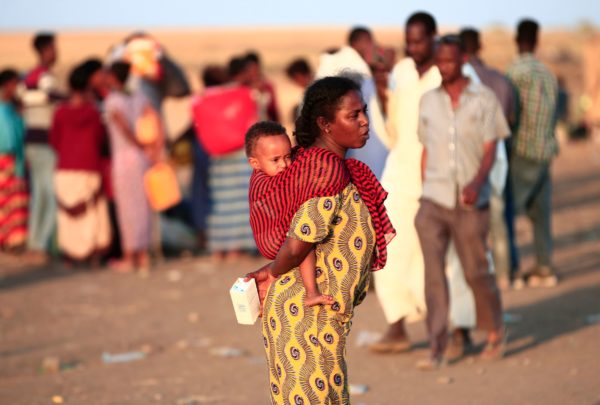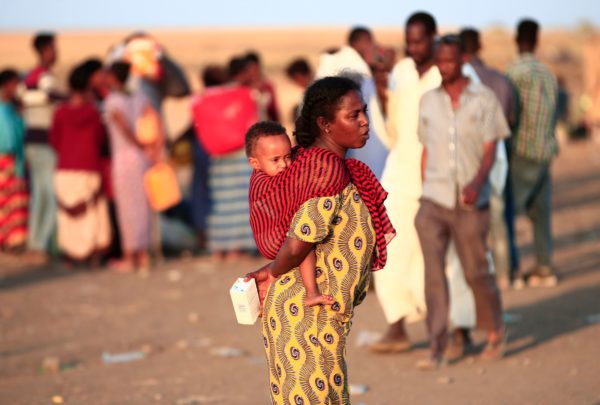Civil War Erupts In Ethiopia, Causing Mass Exodus and Humanitarian Crisis Affecting Neighboring Sudan
Wednesday marked two weeks since internal war got underway between the Ethiopian military and armed rebel forces in the nation’s Tigray region.
The clashes in the northern Ethiopia sector have caused a humanitarian crisis with nearly 30,000 distressed refugees crossing into Sudan to escape the violence, according to United Nations officials.

About 4,000 people have been streaming into Sudan each day. The U.N. expects over 200,000 Ethiopian refugees to vacate the Tigray region over the next six months. Top officials are working with U.N. refugee agency UNHCR, the World Food Programme, the U.N. Children’s Fund and other international relief agencies to prepare camps find food and humanitarian aid for the asylum seekers.
“Every effort should be made to keep children out of harm’s way, and to ensure that they are protected from recruitment and use in the conflict,” UNICEF chief Henrietta Fore said Thursday.
Reuters described Tigray as an arid, mountainous region of northern Ethiopia steeped in a long tradition of guerilla warfare. Rebel fighters from Mekelle, Tigray’s jewel city, stormed the nation’s capital Addis Adaba in 1991 to overthrow a Communist dictatorship.
A powerful Tigray armed militia played a leading role in the revolutionary movement of the early 1990s, which gave the region nearly three decades of standing in the regime that supplanted Marxist rule.
That all came to an end in 2018 when Prime Minister Abiy Ahmed rose to power on the heels of anti-government protests.
Abiy won the Nobel Peace Prize in 2019. But the first signs of friction came in November 2019 when the Tigray People’s Liberation Front (TPLF), the region’s ruling political party, refused to join a unified coalition Abiy established as the foundation of his democratic central government, according to Ethiopian monthly The Addis Standard.
Brewing tensions were heightened in September when Tigrayan leaders defied the prime minister’s order to postpone all elections through October due to COVID-19. Tigray staged elections for 152 regional parliamentary seats, angering Ethiopian officials who characterized them as “null and void.” Abiy repudiated them as illegal “shanty elections” and refused to recognize the votes, France 24, a state-owned French news outlet reported.
Then, on Nov. 4, Abiy ordered a military offensive after TPLF troops stormed the Northern Command, seizing control of the federal army base in Tigray’s capital Mekelle. That was the last straw for Abiy, who said of the attack, “the last red line had been crossed,” the BBC reported.
Weeks of fighting have ensued since then as government forces seek to advance on Mekelle, a TPLF stronghold, to capture the party’s leaders. United Nations officials announced Monday, Nov. 16, that more than 25,000 Tigrayans had sought refuge in neighboring Sudan as the internal crisis rages on. Over 5,000 refugees poured into the Sudanese provinces of Kassala and al-Qadarif on Sunday, Nov. 15 to escape the violence, the largest single-day influx since the conflict began, according to news outlets.
By Wednesday, the number of refugees was up to more than 27,000.
Communications and power blackouts have also been reported as part of the collateral fallout.
Neighboring nations have made calls for peace. But Ethiopian leaders showed no signs of relenting this week.
“Mediation at this point will only incentivize impunity,” Redwan Hussein, a senior government official told reporters on Nov. 16, according to Yahoo News.
The prospect of swaying hardened TPLF rebel forces to capitulate could be a fruitless effort, anyhow.
“Nobody will kneel down here,” one Tigray resident told a Reuters reporter.
By nightfall on Sunday, Nov. 22, Prime Minister Ahmed signaled he was prepared to put that resolve to the test, surrounding Mekelle with tanks and tweeting a dire warning directed at the opposing fighters: “To members of the destructive TPLF clique, your journey of destruction is coming to an end, and we urge you to surrender peacefully within 72 hours, recognizing that you are at the point of no return.”
The fighting has taken its toll and led to a humanitarian crisis. According to U.N. officials, many of the refugees are young men who claim they’ve been targeted by armed forces. Some report they’ve been forced to leave loved ones behind, others have seen family members killed. Mostly all of them have been forced to walk hundreds of miles toting their only earthly belongings, with no sense of security.
During a press briefing on Thursday, Nov. 19, a senior humanitarian official shared the “heartbreaking” toll of the war.
“Many of the refugees left behind children, and parents,” said Babacar Cissé, the UN Resident and Humanitarian Coordinator in Sudan. “They did not have time to assemble their families and leave together. They arrived at the camps after having walked for several days, exhausted and with nothing. Seeing families and children sleeping in the open was heartbreaking.”


 Lifesaving assistance is urgently needed. Here’s how you can help:
Lifesaving assistance is urgently needed. Here’s how you can help: